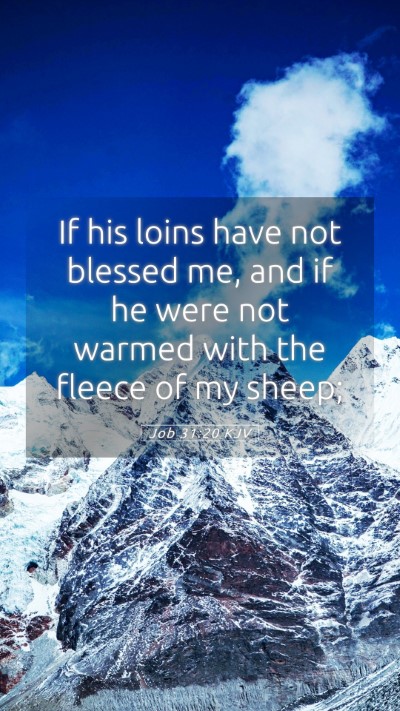Understanding Job 31:20 - A Bible Verse Explanation
Job 31:20 states, "If his loins have not blessed me, and if he were not warmed with the fleece of my sheep." This verse reveals Job's reflections on his conduct and his relationships with those around him, emphasizing the importance of compassion and assistance to others. Here, we delve into the biblical context and analysis of this powerful verse.
Bible Verse Meanings and Interpretations
This verse, when taken in the context of Job's discourse, highlights his integrity, stressing how he has treated others, particularly the less fortunate. Job’s assertion signifies a deep moral connection, wherein he acknowledges the trust and communal bond among people.
Insights from Public Domain Commentaries
-
Matthew Henry's Commentary:
Henry emphasizes Job's principles of justice. He highlights that the act of ensuring that one's herd provided warmth and shelter to others is indicative of conscientious living. Job expresses righteous indignation over his treatment of others, reinforcing the idea of accountability.
-
Albert Barnes' Notes on the Bible:
Barnes interprets this verse as an indication of Job's philanthropic nature, referring to the warmth offered by his sheep to those in need. This statement serves as evidence of Job's generous spirit, asserting that he has never denied assistance to those who looked up to him.
-
Adam Clarke's Commentary:
Clarke identifies the verse as Job's way of defending himself against accusations. He notes that this offers a glimpse into Job's heart, symbolizing the kindness he has rendered to others. Clarke also suggests that Job’s intentions were directed towards protecting the vulnerable, portraying his virtuous character.
In-Depth Bible Verse Analysis
To fully grasp the meaning behind Job 31:20, it's essential to consider the historical and cultural context of the time. Job lived in a society where wealth and status were often perceived as blessings from God. Thus, Job’s defense against accusations of wrongdoing must be seen as not just a personal plea but as a broader commentary on divine justice and human responsibility.
Application of Job 31:20 to Daily Life
This verse prompts reflection on our treatment of others. It provides guidance for biblical exegesis, urging individuals to consider how acts of charity and kindness can impact community relationships. In our modern context, it encourages us to actively support and uplift those around us, reflecting the selfless love Christ exemplified.
Related Bible Cross References
- Proverbs 19:17: "He who is kind to the poor lends to the LORD, and he will reward him for what he has done."
- Luke 6:38: "Give, and it will be given to you: good measure, pressed down, shaken together, running over, will be put into your lap."
- Matthew 25:35-40: "For I was hungry, and you gave me food, I was thirsty, and you gave me drink, I was a stranger, and you welcomed me..."
Conclusion
In summary, Job 31:20 serves as a powerful reminder of personal accountability, compassion, and the importance of treating others with respect and kindness. Through studying this verse, individuals can gain biblical study insights that challenge them to engage in acts of service and develop a deeper understanding of God's expectations for humanity.
Further Bible Study Resources
- Explore Bible study groups for community learning and application.
- Utilize online Bible study tools for deeper engagement with Scripture.
- Consider Bible study guides that focus on social justice themes in the Bible.


